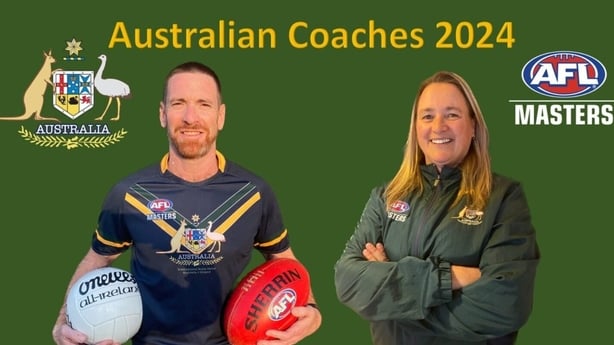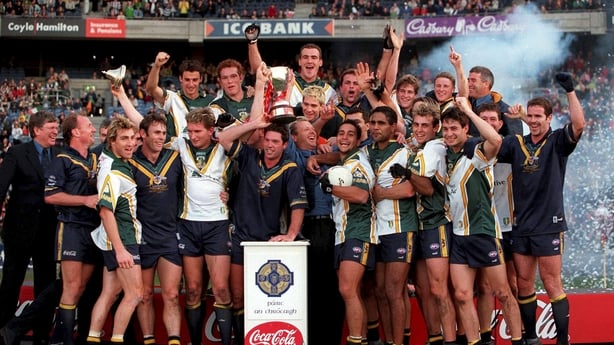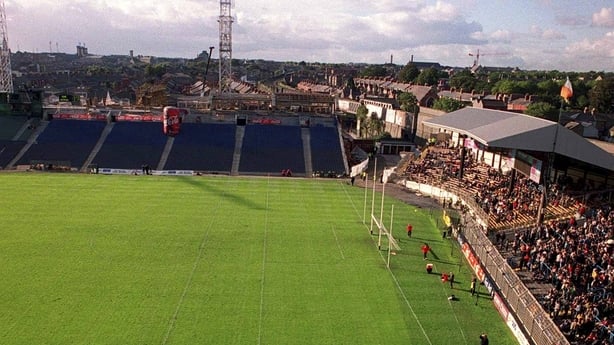It was a few weeks out from the festival season, but in October 2000 the Irish sporting public had a new pantomime villain and, over two decades later, Jason Akermanis is heading back this way having been named last week as the new head coach of the Australian Masters side for their 2024 tour.
The senior international rules side will play tests against Ireland in Galway and Cavan next March with Lisa Ropere taking care of the inaugural women's touring team.
The Australian information pack released alongside the tour dates informed potential applicants that there is a strict 'no d***heads’ rule in place.
Some may expect Peter Canavan to have a wry smile at that particular written inclusion, he’s bound to have called Akermanis a lot worse during and after two infamous Croke Park tests as the pair came to blows on a number of occasions. One national newspaper exclaimed that ‘Aker’ would have been better off playing caid in the 19th century, in what was a rather cultured insult.
With his peroxide blonde hair, Akermanis, who would win the Brownlow Medal for best player in the AFL the following season, already stood out against an Irish side still too cautious to wear anything but black boots and generally stayed safe with a two on the sides and a three on top.
By the time they were making their homeward journey to Australia, Akermanis had rubber-stamped his name all over the series.
Canavan and Akermanis had previous heading into the 2000 series.
The year before, Ireland had won after victory in Melbourne and a draw in Adelaide with Akermanis being named Australia’s Player of the Series for his tight-marking job on the RTÉ GAA pundit.
Fast-forward 12 months and Australia’s Channel Seven commissioned an inside documentary for the 2000 tour. Hosted by Hall of Famer Robert DiPierdomenico, the opening minutes feature him telling then Irish President Mary McAleese that she can call him ‘The Big Dipper’, as he was affectionately known.

The footage also brought viewers inside the Australian hotel for their pre-match first test briefing.
"We tackle to contain and we tackle to hurt – and that’s legally hurt," Oz coach Dermott Brereton told his troops.
He delivered some tactical advice specifically to Akermanis too, telling the Brisbane legend to "just make it that every time he [Canavan] looks up on the field he sees you walking towards him. Get to a stage where he just goes ‘oh no.’"
That stage came inside the first 30 seconds as Canavan collected possession under the Cusack Stand in the opening attack and was met with a loose forearm that left the Irish forward’s nose busted open and needing the blood rule. Akermanis stood over him, dishing out plenty of verbals as Canavan tried to regain his composure.
The pair had a set to on Canavan’s return before in test two, it boiled over completely with fists flying between the pair leading to both being sent off and banned for the first test of the 2001 series.
In 2010, reflecting on the fights, Akermanis claimed that Canavan ran away "like a big baby", but the passage of time has defrosted relations and the compliments pour out of the Australian in relation to the six-time All-Star.
"He was really quick and he was too dangerous really," Akermanis told RTÉ Sport of Canavan’s ability.
"Because he was that dangerous, there wasn’t too many guys that had the speed and the endurance to go with him because he was lightning.
"There wasn’t a lot of him as far as the strength side but he was lightning. If we didn’t stop him we really didn’t have a chance of beating Ireland and that was as simple as it was. That’s how dangerous Peter was.
"With Peter and I, we’re not renowned for getting into scuffles and fights in our own leagues. When you play for your country it must just be that little bit more. Both of us were doing stuff that we’d probably never do in our careers.
"The passion of playing for your country, I think. We play in a very physical game [AFL], it’s still very physical, they protect the head a bit more these days, but it’s still a really physical game for us.
"The Irish, not being that type of game, it just takes them a little longer to get used to the physical side because they’ve got the skill and everything else.
"There wasn't a lot of him as far as the strength side but he was lightning. If we didn’t stop him we really didn’t have a chance of beating Ireland and that was as simple as it was."
"It was a shame, it kind of got out of hand a few years later [2006] and they’re not doing it."
Akermanis wasn’t exactly pelted with tomatoes as the team hit the tourist hotspots of Dublin, Cork, Clare and, er, Downpatrick, during their time here, but he was a bit of a precursor to Thierry Henry and his glue-like hands.
That was most notable in the inflated attendance for the second test. A crowd of 38,016 were present the first day as the visitors won 55-47, with that growing to 57,829 a week later as Australia secured a 2-0 success with a 17-point victory.
Akermanis’ dismissal was another controversy to add to the list of many that followed the player throughout his career.
A hugely polarising figure, he had run-ins with numerous coaches and players and in 2006 it was reported that the Brisbane Lions coaching panel and senior playing group had voted unanimously (12–0) not to let him return to the club.
In 2012, Akermanis’ comments on Jim Stynes shortly after the Dubliner’s death drew ire, although the player quickly apologised, and did so on numerous occasions.

On the field though, he is an undoubted AFL great having accumulated three Premierships, four All-Australian spots and a Brownlow medal while he was inducted into the AFL Hall of Fame in 2015.
Asked whether controversy was something he thrived on, Akermanis replied:
"People tend to like a villain; they’ve got to have someone not to like and someone to like so I suppose it always fits the narrative or the media if I was the evil enemy.
"I did have my controversies in my playing career but, you know, you look back now and none of them were actually that bad, they weren’t terrible.
"The controversy when you’re playing for your country, if you got into too many fights or anything like that, that only happened once or twice so not really too much to back up people’s argument.
"But I’ll take the evil side and that I need to be the villain, but it certainly was never something I tried to do. In the end there’s nothing you can do, you just got to laugh it off and just keep going."
Next year’s masters’ series, with a number of games taking place over different age grades, will be a reminder of those Ireland and Australia battles of the past.
Last played in 2017, there were due to be tours in 2020 and 2022 before the Covid pandemic originally delayed those plans before they were firmly put on ice. Earlier this year, GAA President Larry McCarthy said it "was off the table for the foreseeable future."
For Akermanis, a return would be welcome – but he feels that a change of location could be key to reigniting it.
"It’s really up to the GAA, if they’d like to get it back. They are the ones that are worried more than the Aussie Rules guys, I think they love it.
"If we could get a series, maybe in US in Boston or somewhere up there, that would be good, the world is ready for that.
"I would love to see it back, but it’s just what the GAA want to do. The AFL wouldn’t have a problem."
GALLERY: International Rules Down The Years
When the 2020 and 2022 tours were announced, since postponed, RTÉ pundit Tomás Ó Sé was highly scathing of the move, describing the series as a "golden goose" for AFL sides looking to recruit Irish talent.
The Irish experiment, as it is commonly known, significantly ramped up from 2005 onwards with a raft of players making the move with varying degrees of success, and Akermanis doesn’t see that flow slowing down any time soon given the GAA’s continued amateur status.
"The two things that stand out for the Irish coming here is that they’re always very fit and can run but their skills to adapt to the oval ball are outstanding.
"The chance for them to play professionally has got to be pretty cool. It still baffles me how the GAA don’t have it as a semi-professional compy [competition] after all these years.

"When we were out drinking with the Irish boys in 1999 we were saying we can’t believe you don’t get paid and the GAA is very wealthy. Even now we’re baffled that they couldn’t make it more professional and the players get paid.
"You see the Irish players coming now and it’s a big step. We’ve had Conor McKenna here [in Brisbane] who has gone back and won his All-Ireland and played for his county and has come back to the Brisbane Lions who are really, really close to winning a flag.
"They are pretty good stories and there’s a lot of them. They’re big, they’re strong, they fit in well. It’s such a good thing for the Irish players, both the women and the men, to come here, we love it."
And when Akermanis does land in Ireland for the first time in 24 years next March, a map will inform him that only Fermanagh separates their Cavan base from Canavan’s Tyrone. Like all good feuds, he hopes its official conclusion will come over a pint.
"I still have his Irish jumper, he’s still got mine. If I ever saw him again I’d shout him whatever drink he wanted."

